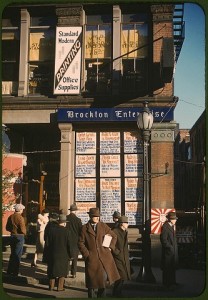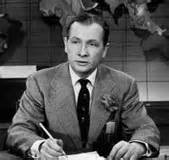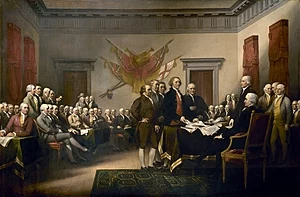(This will be in two parts, going from the general to the sublime. Tune in midweek for Part II, “All the News That’s Fit to Print”)
The title is something of a misnomer, in that the mainstream media is largely irrelevant already, and while a lot of people would like to credit Donald Trump for this slide, it has actually been heading in that direction for many years.
I can’t say exactly when the American people’s romance with the media began its decline, but it was a phony romance from the beginning. Alexander Hamilton, in the Federalist Paper 84 announced that a “freedom of the press” clause in the proposed Bill of Rights was unnecessary, believing that common law concerning libel and defamation were quite satisfactory in restraining excesses by the press.
The people saw their press (media) as a source of news, a type of community bulletin board (in fact, that’s how many got their news all the way into the 1940s).

A majority of the People were never interested in the opinions of the editor (1760-2016), only maybe around election time. And then, his opinion mattered only to the extent that he had been faithful in writing the news accurately and objectively the other 49 weeks of the year.
There’s a thought process involved there that really has never wavered over the 228 years of our existence. Over time the newspaper evolved from a pamphlet sized leaflet that could be hung on fence post to multi-page affair, with a page of national news, covering wars, disasters, etc, gathered by wire services, to a section that covered only local news (metro) gathered by local beat reporters, to sports news, from the Yankees to the high school Cardinals, a page of the all-important obituaries and legal notices from the courthouse, even a comic section for the kids. Only larger city papers had a business section, usually showing up in the Sunday edition. And finally, near the back, there was a page of opinions by the editor, and later, syndicated journalists, including a section for local letter writers to vent their disappointment or anger at the local mayor, another letter writer, the owners of Joe’s Tire Emporium for selling leaky recaps and finally that editor himself, who was almost always a scalawag and a mountebank.
No section of the newspaper was read by all the people. Everyone read the headlines of the front page, and for many, that was their news for the day, or week, unless they turned on the radio at 6 (once that became a national habit during World War II) or visited the Bijou regularly, where, from the 1920s into the 60s, there was Movietone News, which is how most kids got their first glimpse of the D-Day invasion fleet, MacArthur coming ashore in the Philippines, or the greatest bevy of bathing suit-clad beauties from Hollywood.
Few people actually followed the details of a front-page story back to where it was concluded on page 7. Fewer than 20% ever turned to the Editorials, and those were usually the upper echelons of the city’s business and political community.
This newspaper format was a big stretch from the colonial days, because they wanted to be able to reach a much broader spectrum of the population out there in order to make a profit, which they did thru advertising (Joe’s Tire Emporium) plus a small surcharge to subscribers which covered home delivery. Statewide papers even used the mails. Their life’s-blood was advertising. Without advertising newspaper owners couldn’t even pay for the ink.
Trust me on this, it has only been in recent years, in our lifetime, that the average American has given a hoot in hell about what was going on in Washington DC. And therein lies the tale of separation between the American people and the modern media. It was forced upon them.
All the people ever wanted was “the news”, which was and always has been, local. Everything else was just a fleeting headline, barely even a topic of conversation, unless a war was on..
So, in all other areas of their lives the media (the press) were irrelevant, only by the 1960s this situation had become intolerable to the television wing of national media.
It was the people’s access to news the Founders wanted to protect and foster, a “free-market press”. It was for readers to decide what, or how much of what the media wrote was trustworthy or even interesting. What the Founders feared was a state-run press, which like a state religion, the people found repugnant.
From the 1960s forward, newspaper readership fell. Slowly at first, then drastically. It was mostly about money, shrinking advertising dollars, because people were getting their news first from national radio, then television networks. The reasons were simple, optics and speed. Even before television, and the need for speed in getting news from the theaters of the war, radio networks (only two in those days) proved to be as much as a day faster in getting war news to families gathered around the radio every evening at 6. Unlike the newspapers, that news was without editorial comment, and sounded more sophisticated and objective. Listeners never imagined in their minds eye network broadcasters with bow ties, rolled up shirts sleeves and a big cigar chompeing in the corner of their mouth. Some probably even thought Douglss Edwards wrote his own stuff.
For four years this image of a bipartisan, above-the-fray, honest but neutral reportage settled into a whole generation of Americans, and was an image the national networks hoped to foster, as a class of news journalists a cut above the stogie-chewers down at the city desk in Baltimore.
FDR introduced Big Government 2.0 in 1932 and it needed an advertising agency. Whether by design or by happenchance (a little of both in those early radio years, I suspect) the networks was that medium, but it would take a few years for that metamorphosis to take place, for you see, the specter of rising communism, the Red Scare, made the people less trustworthy of the media. The media was all-in for America when the enemy was fascism, but we’re all still waiting for the New York Times to say something unkind about Stalin, or CBS about Mao, Ho Chi Minh or Fidel Castro, or NBC Islamic jihad, or Obama-Clinton all of the above.
This did not go unnoticed so while Truman squeaked by in ’48 with the help of the national media, what happened next was the Cold War.
Some also called these the Ike Years, 1952-1960, when the national media returned to be as irrelevant as it had been since Lincoln.
National television news was still a 15-minute-a-day family routine, not much different from that radio routine during the war. John Cameron Swayze came on every evening and sat at a desk almost as empty as Obama’s in the Executive Office, and read the daily news in a monotone voice for fifteen minutes, then signed off. His sponsor was Camel cigarettes, and he was considered the “television voice of the Korean War”.
This was when network television was at it most credible.

But it was also boring. CBS with Douglas Edwards was just as stem-winding and America snored in the minds of New York ad-men. Ike was boring and Washington was the furthest thing in the peoples’ minds. Moveitone News was the sexiest news show in America. There were no on-site reports from the war in Korea (Ike ended it without a single riot or student protest). No one reported from Washington, London or Paris, not even the golf course at Gettysburg.
In 1960, the national media needed a rescue, and found a new power by being able to bring about the election of a charismatic, debonair, but philandering, John Kennedy over a pasty-looking, dull Dick Nixon, simply by keeping the American voters in the dark about JFK’s liaisons. Several cardinal rules of journalism and politics had been broken, lines crossed. for the media had never intentionally misled people with malice aforethought as they did in 1960. And they got away with it. JFK was so handsome that the Democrats even got away with stealing the Chicago vote, and hence the election.
The network media learned two important lessons: First, as P T Barnum opined, “There’s a sucker born every minute” for they were able to keep all stories of JFK’s philandering out of the public eye..the kind of success we’ve seen reprised for Bill Clinton (sex), Obama (chronic lying and incompetence) and Hillary in a multitude of criminal acts. And second, the media learned that the new generation, (Baby Boomers who saw JFK as a god) could be conditioned to see Washington as The Source of all good things, So, from 1963 on, they could ride the backs of my father’s generation, who had given them street cred because of the war, while turning their children into a kind of min-numbed robot, with all eyes turned toward Washington. The media were in total charge of what people saw and how they saw it.
Turning half those children into antiwar protesters, where the brightest went one way and the best the other, they made their first claim of ownership in the enterprise that was about to unfold.
So, it was no problem at all to launch Big Government 3.0 with LBJ’s Great Society, which has turned out to be one of the greatest criminal acts (much worse than slavery) plus trillion dollar Ponzi scheme, ever devised in modern world history.
The rest, I suppose is history, for the natural inclinations of men like Salant and Friendly at CBS was to seize new territory by creating networks (circles) of friends inside government and the news industry. The elixir of power. In the process they would eventually, partly by opportunity, but also by lustful disposition, abandon both “the people” and “the truth” for whom the Bill of Rights protected them to protect….a process we can now see among similarly situated young conservatives who have tasted that same elixir. A potent brew.
(One of the ironies with the rise of Donald Trump and his attempts to re-institute the irrelevance of the national media, has been the reaction of a conservative for-profit satellite industry to the same media establishment they are suppose to want to see diminished, but to whom they vowed undying allegiance in order to insure that Donald Trump loses for fear he may actually succeed in this attempt to return the press and the national capital, to its original position in the Constitutional scheme.Go figure.)
So, the media had gone from irrelevant in the 1950s to co-equals with the political class by the mid-70s, at the same time seeing their standing with the American people, who today, alternately pay no attention to them at all or don’t believe when they do read or see them. (Count me among the latter.) fall off the charts.
Consider: During the Reagan Administration, against whom the media stood shoulder-to-shoulder, with the same solidarity they did Civil Rights, the Vietnam War, the innocence of Michael Brown and lately, a first-grader’s right to declare his/her own sex…(Notice the declining importance of the issue over 50 years?), in polling questions, “gets facts straight” the media had fallen below 50% among Americans, while “deals fairly with all sides” was never above 35%, and is today hovering around 20%.
The MSM had become the least respected and, to the lives of about 80% of the American population, the least relevant, at the same, 1992, it had acquired all its power from the other 20%.
It had become “Hollywood for the ugly”, which Paul Begala once used to refer to Washington in general.
So yes, of course, we have a “state media” today, only it would be difficult to say it is “state-controlled”, which implies a subordinate position to the government. America’s media is part of the ruling class. It is one of the helmsmen guiding the national ship, and unless the people and politicians who really want to defeat the power of the media, don’t understand this, they will never understand the full arsenal the media has at their disposal to protect their turf.
Making the Media Irrelevant…Again
Donald Trump has moved several steps in this direction, having stripped the media of almost every vestige of pretend objectivity which for fifty years it has been able to think about itself.
In the eyes of the people the media is already pretty much irrelevant. If all the people, not just 80%, turned off all their television, computers, including Drudge, Limbaugh, Twitter, Facebook, the media would continue to go, like a spacecraft lost in space, until it ran out of fuel and food. It’s ability to think itself relevant even in an empty void, is almost endless.
If you are looking for ways to defeat them (and that requires teams of bright minds) you must understand this estimation of themselves. and the very personal signals they receive when they know the jig is up. Consider Brian Williams and Dan Rather, both of whom refuse to admit, even to themselves, that they have become irrelevant, or that they did it to themselves. Their circled of power is only partially destroyed.
The media’s three strengths are 1) the power it has to raise politicians up in the public’s eye, thereby reserving unto itself the attendant power, to destroy them, 2) the fear the public-at-large still has for the illusion of a greater power in the media than it actually possesses, and 3) its full fledged membership in the aims and ambitions of what we once thought was simply the Left, but now know to be a much broader ruling class, made up of not only leftwing ideologues, but also power-hungry politicians of no particular ideology except the one that keeps them in power and protects their rank. (This single belief kept the feudal system alive for a thousand years, if you’re looking for a yardstick as to what this cabal thinks about itself, or what it can do.) The introduction of a capitalist element into this consortium gives it all the earmarks of a genuine fascist oligarchy, where any specific political philosophy is secondary, held closely only to a few of its members. (This explains how the editors at RedState can so comfortably and guiltlessly sleep with the Clinton campaign.)
We will deal with how to deal with this: Next, Part II, All the News That’s Fit to Print



